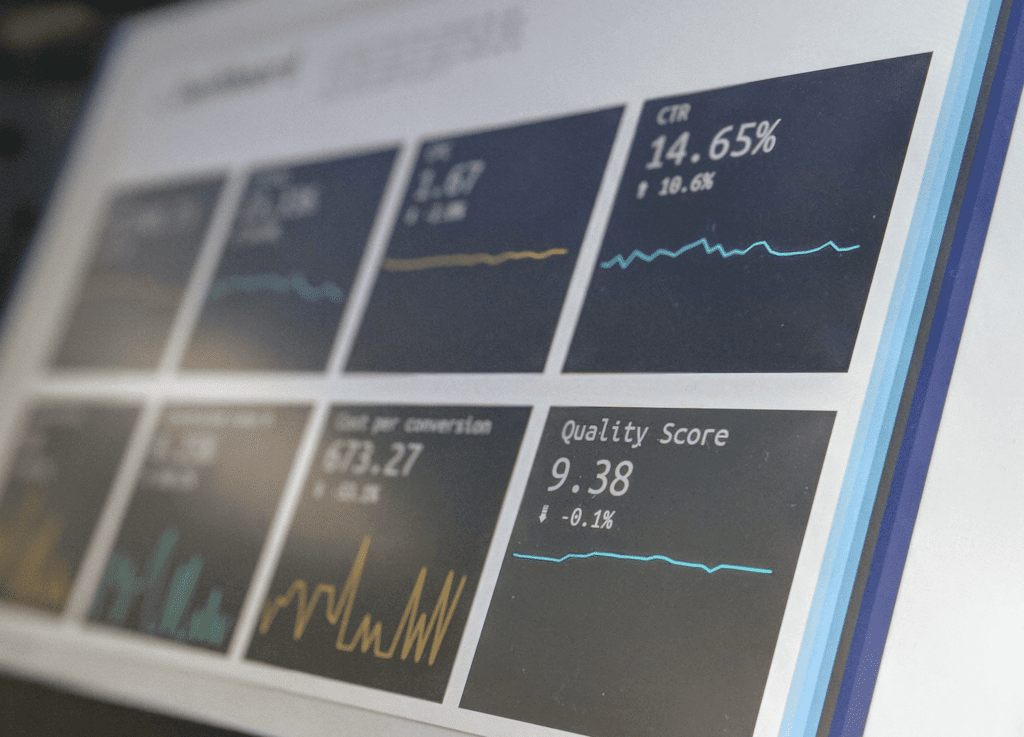Introduction
Today more than ever, organizations face the constant challenge of extracting actionable insights from the vast amounts of information available. IT leaders are drowning in data; 60% are overwhelmed by data, and 89% say business operations must invest in tools and technologies to extract value from their data and turn it into actionable intelligence.
This is where Business Intelligence (BI) comes into play. Let’s explore the definition of BI, understand its significance in modern business, and delve into the crucial role played by Business Intelligence Service Providers.
Are you or your company overwhelmed by data?
Don’t hesitate to schedule a free consultation with us.
What is Business Intelligence?

Business Intelligence is gathering, analyzing, and interpreting data to make informed business decisions. It involves transforming raw data into meaningful insights and delivering them to stakeholders at the right time. BI encompasses a wide range of activities, including data collection, data modeling, data visualization, and reporting.
Importance of Business Intelligence in Modern Business
In the digital age, organizations are flooded with data from various sources, such as customer interactions, sales transactions, social media, and more. Without an effective business intelligence strategy, this wealth of data remains untapped, and businesses miss out on valuable opportunities. Here are a few reasons why BI is crucial in modern business:
Data-driven decision making
BI empowers organizations to base their decisions on reliable data and evidence rather than gut feelings or assumptions. It provides actionable insights that enable leaders to make informed choices that drive growth and efficiency.
Competitive advantage
Organizations need to stay ahead of the curve in a highly competitive market. Business intelligence helps identify market trends, customer preferences, and emerging opportunities, giving businesses a competitive edge by enabling them to respond quickly and proactively to changes.
Enhanced customer experience
Business intelligence helps organizations understand customers’ needs, preferences, and behaviors by analyzing customer data. This knowledge enables personalized marketing campaigns, tailored products or services, and improved customer service, resulting in a better overall customer experience.
In the next sections, we will explore the functions and benefits of business intelligence services and essential factors to consider when choosing the right provider for your organization’s needs.
Business Intelligence Providers

What is a Business Intelligence Service Provider?
A BI Service Provider is a specialized company, like Data-Sleek, that offers various services to assist organizations in implementing, managing, and leveraging business intelligence solutions. These providers possess expertise in data analysis, modeling, reporting, and visualization and in-depth knowledge of business intelligence tools and technologies.
The primary role of this provider is to help businesses harness the power of data to make informed decisions, gain actionable insights, and drive strategic growth.
Key Functions and Services Offered by BI Service Providers
Data integration and management
BI Service Providers assist in understanding business processes, collecting and integrating data from various sources, including databases, spreadsheets, cloud platforms, and third-party applications. They ensure the data is cleansed, transformed, and structured for analysis, creating a unified view of the organization’s information.
Data modeling and analytics
BI solutions employ data modeling techniques to create logical and meaningful data representations for transactional or operational processes. They design and develop data models, data warehouses, and data marts that optimize performance and facilitate efficient querying and analysis. These providers also offer advanced data analytics capabilities to uncover valuable insights and trends, including descriptive, diagnostic, prescriptive, and predictive analytics.
Reporting and visualization
BI Service Providers help organizations generate comprehensive reports and visually appealing dashboards that present key performance indicators (KPIs) and metrics clearly and intuitively. They leverage visualization tools and techniques to transform complex data into interactive charts, graphs, and infographics, enabling users to interpret and explore the data easily.
Performance monitoring and optimization
BI Service Providers assist in monitoring the performance of the business intelligence infrastructure, ensuring optimal query response times, data accuracy, and system availability. They identify and address performance bottlenecks, fine-tune queries, and optimize data models to enhance overall system performance and provide valuable data.
Don’t let the power of your data go untapped. As a premier provider of Business Intelligence services, Data-Sleek is here to help you make sense of your data, uncover actionable insights, and drive your strategic growth. Whether you need assistance with data integration, data modeling, analytics, or performance monitoring, our team of experts is ready to guide you every step of the way. Contact us today to start transforming your data into a powerful business asset.
Benefits of Partnering with a BI Service Provider
Cost savings and scalability
By partnering with a BI Service Provider, organizations can avoid the upfront costs of building an in-house BI infrastructure, including hardware, software licenses, and skilled resources. Instead, they can leverage the provider’s infrastructure and pay for the necessary business intelligence services, allowing for scalability based on evolving business requirements.
Access to expertise and specialized tools
BI Service Providers have experienced professionals with specialized data analysis, modeling, and visualization skills. They stay updated with the latest BI tools and technologies, enabling organizations to leverage their expertise and gain insights from advanced analytics techniques that might be challenging to implement in-house.
Improved decision-making and competitive advantage
BI Service Providers help organizations make data-driven decisions by providing accurate, timely, and relevant insights. They assist in identifying trends, patterns, and outliers that may go unnoticed, enabling organizations to seize opportunities, mitigate risks, and gain a competitive edge in the market.
For example, for financial companies, having access to reliable financial and operational data is crucial for making informed decisions. BI Service Providers can offer sophisticated business analytics tools and expertise that allow financial institutions to analyze vast amounts of financial data efficiently. By partnering with a BI Service Provider, financial companies can help with risk management, revenue optimization, compliance and regulatory reporting, operation efficiency, and forecasting.
Importance of a Data Warehouse for Partnering with BI

Before engaging with business intelligence technologies, organizations should prioritize the implementation of a data warehouse. A data warehouse is crucial in facilitating effective data management and analytics. If a company does not have a data warehousing solution before partnering with a business intelligence consulting firm, it may encounter several challenges and limitations in its BI initiatives. Here are some potential consequences of not having a data warehouse:
Data Fragmentation and Inconsistency
Organizations often face data fragmentation, where data is scattered across multiple systems and databases without a data warehouse. This fragmentation can lead to data inconsistencies, duplications, and discrepancies, making it difficult to obtain a reliable view of the data. Inaccurate or incomplete data can severely impact the quality and accuracy of the insights generated by business intelligence tools.
Data Complexity and Inefficiency
Accessing and analyzing data from multiple data sources becomes complex and time-consuming without a centralized data warehouse. Data retrieval and integration may require manual efforts and custom data extraction processes, leading to inefficiencies and delays in obtaining insights. The lack of a streamlined data infrastructure can hinder business performance.
Limited Historical Data Analysis
Historical data is vital in understanding trends, patterns, and performance over time. Organizations may struggle to retain and effectively utilize historical data without a data warehouse. The absence of historical data can limit the depth of analysis and hinder long-term strategic decision-making. BI Service Providers may face challenges conducting comprehensive trend analysis and forecasting without access to historical data.
Performance and Scalability Issues
Analyzing large volumes of data without a data warehouse can strain the performance of the underlying systems and impact overall scalability. Queries and data retrieval processes may be slow and inefficient, leading to delays in generating insights. As the organization’s data grows, the absence of scalable data infrastructure can exacerbate performance issues and limit its ability to scale its BI initiatives effectively.
Data Governance and Security Risks
Data governance and security become more challenging without a data warehouse. The lack of a centralized platform for implementing access controls, data privacy measures, and data governance policies can increase the risk of data breaches, unauthorized access, and compliance violations. Organizations may struggle to enforce consistent data governance practices and maintain the necessary data security and compliance levels.
Increased Implementation Complexity and Costs
Partnering with a BI Service Provider without a data warehouse can increase complexity and costs during the BI implementation. The BI Service Provider may need additional time and resources in data integration, cleansing, and modeling activities. The absence of a centralized data repository can result in longer project timelines and higher implementation costs.
While it is possible to work with a business intelligence consulting firm without a data warehouse, the challenges above can significantly impact the effectiveness and efficiency of the business intelligence initiatives. Establishing a data warehouse before partnering with a business intelligence consulting company is highly recommended to ensure a solid foundation for data management, data quality, performance optimization, scalability, and data governance.
Available Business Intelligence Tools for Data Analytics and Reporting

Suppose your organization wants to develop in-house capabilities for Business Intelligence and take a self-service approach to data analysis and reporting. In that case, numerous business intelligence software are available in the market. These tools provide robust features and functionalities, enabling users to explore data, create visualizations, and derive insightful reports. Here is a list of popular BI tools to consider:
Microsoft Power Bi
Microsoft Power BI is a leading BI tool offering a comprehensive suite of data analysis and visualization capabilities. It provides a user-friendly interface, seamless integration with Microsoft products, and robust data modeling capabilities. Power BI caters to business users and data professionals, making it suitable for organizations that build in-house BI capabilities.
Tableau
Tableau is a widely recognized and powerful data visualization tool that allows users to create interactive dashboards, reports, and visualizations. With its drag-and-drop functionality and extensive library of visualization options, Tableau enables users to explore data and communicate insights effectively. It offers a range of products, including Tableau Desktop, Tableau Server, and Tableau Public.
Metabase
Metabase is an open-source business intelligence tool that focuses on simplicity and ease of use. It allows users to create charts, dashboards, and ad hoc queries with a simple and intuitive interface. Metabase is suitable for organizations looking for a lightweight and cost-effective data analysis and reporting solution.
MicroStrategy
MicroStrategy offers a comprehensive enterprise BI platform with robust reporting, analytics, and visualization capabilities. It supports large-scale deployments and provides a unified platform for data discovery, dashboards, and mobile analytics. MicroStrategy’s strength lies in its scalability and enterprise-grade features.
Google Data Studio
Google Data Studio is a free web-based BI tool that enables users to create dynamic and interactive reports and dashboards. It integrates with various data sources, including Google Analytics, Google Sheets, and SQL databases. Google Data Studio is user-friendly, making it an accessible option for organizations building in-house BI capabilities.
Let Data Sleek Help
Data Sleek is well-equipped to assist organizations in building a robust data warehouse and implementing practical Business Intelligence (BI) solutions. With our expertise and experience in data management, analytics, and visualization, we can empower businesses to unlock the full potential of their data and make informed decisions that drive growth and success.
Organizations can benefit from our comprehensive range of services by partnering with Data Sleek. We will work closely with your team to understand your requirements, goals, and challenges. Our experts will guide you through designing and building a scalable data warehouse that consolidates data from various sources, ensuring data integrity and reliability.
Once the data warehouse is established, we will collaborate with you to implement a powerful business intelligence technology tailored to your organization’s needs. Our team will leverage cutting-edge tools and technologies to transform raw data into meaningful insights. We will design intuitive and interactive dashboards and reports that clearly represent your data, enabling you to monitor key performance indicators, track progress, and identify actionable insights.
We’d love to hear from you if you’d like to learn more.







